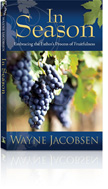 As the new year begins let me share with you a chapter from my latest book, In Season: Embracing the Father’s Process of Fruitfulness. If you haven’t read them earlier, you can read earlier parts of the book here: Introduction and Chapter 1.
As the new year begins let me share with you a chapter from my latest book, In Season: Embracing the Father’s Process of Fruitfulness. If you haven’t read them earlier, you can read earlier parts of the book here: Introduction and Chapter 1.
Chapter 2
I am the vine; you are the branches.
If a man remains in me and I in him,
he will bear much fruit; apart from me you can do nothing.
JOHN 15:5
I was born into a family of farmers. My father owned and lived on a vineyard, as did his father before him. I grew up among rows of grapevines that stretched toward the horizon. I have worked in the vineyard during the heat of summer and the frigid cold of winter. It was in the vineyard that I began my spiritual journey.
This is why John 15 is one of my favorite passages in Scripture. In it Jesus uses the metaphor of a vineyard to teach his disciples how they could follow him into a relationship with his Father that would make them fruitful and fill them with his own special brand of joy. As a farmer in a vineyard, a student of Scripture, and someone who has been on a life-long adventure of growing to know the Father, I want to invite you into the vineyard with me to learn what so many have missed. Jesus really did offer each one of us a relationship with his Father that is more real than the breath we take and more natural than we dare believe. My favorite time in the vineyard is the waning days of winter.
It is still only mid-February, but in the short winters of California’s San Joaquin Valley, spring is just around the corner. The ever lengthening days are already clawing at winter’s grip. In the late afternoon the long yellow rays of the setting sun have surrendered to violet-tinted shades of pink. Though it was a warm afternoon, the evening chill comes quickly. I zip up my coat against the light breeze, pulling the collar up around my neck and thrusting my hands into the pockets. Lights from distant farmhouses have already begun to twinkle against the fading landscape, and out of the diaphanous shroud of evening ground fog that obscures the horizon, rows of grapevines curl over the hills and completely surround me.
The vines are all neatly trimmed, their branches gently twisting around the wire strung from the posts that stand as sentinels beside each vine. The hard work of winter brings surrealistic order to the vineyard. Should anything in God’s creation be so tightly clipped and neatly arranged?
The vineyard is at rest, waiting patiently for the glory of springtime and another season of fruitfulness. I guess that’s why I like this time of year so much. In the moments just before darkness settles in, the wispy fog and the neatly trimmed rows combine to grant me that marvelous gift of secluded peace. Except for the softened whine of a few cars far away, the only sound I hear is the crunching of dirt clods underfoot.
Only a few months ago the air was filled with dust, voices, and churning of tractor engines that mark the frenzied drive of harvest to get the raisins in before the first rain. A few weeks from now those same noises will fill the air as the process of fruitfulness starts all over again. But now it is quiet. And though a glance from a distant farmhouse might lead someone to believe that I am alone, it is not so. I have come here at this time to walk and talk with the Father.
This has been my cherished prayer closet since I was a young boy. It is a sanctuary of greater reverence than I’ve known in any cathedral built by human hands. No place on earth more quickly draws me to him, because it is here that we first met, and here we have met so often. This is where I began my spiritual journey.
This is my father’s vineyard—a thirty-five-acre ranch in the heart of California’s Central Valley. For almost all of his first sixty-five years he lived and worked within a mile of this very spot. The farthest he ever traveled, interestingly enough, put him in another vineyard, this one in northeastern France, where he was wounded in battle just before New Year’s Day 1945.
After the war he purchased the farm next to the one on that he was reared. This vineyard provided for his family, but more importantly, also provided the opportunity to teach his four sons about God and his ways. I’ve learned more about God in this vineyard than in all my years of Bible training and study. I learned from the lessons Dad taught us and that he backed up in the integrity of his own life and experience. I learned about the cycles of the seasons, of God’s faithfulness, of overcoming adversity, and of surrendering to his will. Most of Dad’s lessons came from Scripture, but many others came from his lifetime of growing grapes.
And I grew to know God in my long walks through the vines, usually at dawn or dusk. I read Scriptures and learned to voice my concerns to him, telling him my deepest secrets. Eventually I began to hear him respond—simple stirrings, gentle insights, and eventually deep convictions; the voice of God superimposed over my own thoughts. I could know what was on his heart in the same way I was letting him know what was on mine.
I remember the first time I touched a presence bigger than myself. I wasn’t more than eleven or twelve years old and had gone for a long walk. I was standing in a row of vines some distance from the farmhouse and made a simple request. “God, if you’re real, would you show yourself to me?”
Honestly, I didn’t mean at that exact instant, but in the next moment a soft breeze wafted through the vines. My skin began to vibrate as I sensed something or someone was coming close. I looked about anxiously to see if any of my brothers had followed me out into the vineyard, but they had not. The air became rich and clear and my mind filled with thoughts about the God I’d always wanted to know.
He seemed to surround me and flow right through me. My heart pounded, the hair on my neck stood straight out. At first it was pure delight, but the more I questioned what was happening, the more fearful I became that a voice would speak or a vine would suddenly burst into flames. I wasn’t ready for that. Eventually the fear overwhelmed me and I ran back to the farmhouse as fast as I could.
What had I touched? It was a presence undeniably distinct from my own. It felt wonderful and scary all at the same time.
And though I promised myself I’d never do that again, I would soon find that my desire for him would overrun my fears and I’d find myself again praying that prayer. He didn’t ever show up like that again, but he continued to make himself known to me in ways that endeared my heart to him as I continued to grow.
That’s why the vineyard has always been my special place, and it is no wonder to me that when Jesus wanted to reveal the reality of living in his kingdom he made rich use of farming and, in particular, vineyard illustrations. No other metaphor offers such a rich source of instruction, encouragement, and challenge. The passages of Scripture that deal with vines and grapes are among my favorite. I have not only studied them but also lived them, and they have changed my life. The vineyard of my childhood is not so different from those that Jesus would have walked through with his disciples and spoke of in stories.
On that last night before his impending trial and excruciating execution, he wanted to prepare his disciples for life with him beyond his death and resurrection. Where did he take them? He brought them to a vineyard to teach them their last lesson. Among those vines he spoke of a greater vineyard beyond space and time—his Father’s vineyard. He told them that he alone could make them fruitful and in doing so would put his joy in us so that our joy might be full.
Fruitfulness and fulfillment are the themes of the vineyard. Who doesn’t want joy and peace deep enough to hold us through the worst circumstances, and a sense of purpose that comes from knowing our lives make a difference in the world? For many, however, these promises remain only an elusive mirage. Though many things in this world promise fulfillment, they only bring moments of happiness that quickly fade to emptiness. None of them offer the enduring joy and peace we were told they would give us. So people are not surprised when religion’s joy seems fleeting as well, when the joy of salvation quickly gives way to the rigors of discipline.
Sadly, most think they are the only ones who feel that way. They look around not knowing that others are pretending as well. Even those Christians who try to convince others that they have found the secrets of fulfillment and fruitfulness often prove by their own personal stress, immorality, or spiritual emptiness that they have not. Religious activity will never lead to the fruitfulness and fulfillment Jesus promised his followers. When Jesus led them to a vineyard he wanted them to know that the way to the fullness of life lies through the reality of a relationship—not the dictates of a religion.
I have long since left the ranch and moved to more urban settings. My days are no longer filled with vineyards but with computers, automobiles, and other machinery of our technological age. It is easy to be seduced into the mistaken notion that spiritual growth lies in carefully observed principles and rituals, rather than the more organic realities of a growing relationship.
We are organisms, not machines. Our spiritual growth patterns have more in common with the four grapevines growing today in my backyard than they do with the computer on which I am typing. That is why when it comes to spiritual growth, Scripture makes such vivid use of the images of a vine growing in a vineyard and the ever-shifting seasons that influence its growth.
Let’s go to the vineyard together, you and I. Let’s walk the rows with the Father of the vineyard and watch his vines grow and bear fruit. We’ll even get to stop, pull back the leaves, and behold the marvelous process of bringing a vine to fruitfulness. Let him teach you the lessons of the vineyard and show you the secret of finding the fullness of joy and fruitfulness that he promised to every believer—including you!
___________________
This is Chapter 2 of my new book, In Season: Embracing the Father’s Process for Fruitfulness. Copyright 2011 by Wayne Jacobsen and used by permission. Available from Lifestream.org
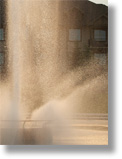 The other day this photo arrived in my inbox. Photographer Kent Lindsay, a frequent listener to The God Journey, said that this photo came to mind as he was listening to one of our recent podcasts, Conversations That Matter. He wrote that he found such peace in this photo because it reminded him that the kingdom of God is an unforced reality that is spilling out in the world and we are merely children letting it fall on us. With his permission, I get to share his photo with you. (You can find out more about his work here.)
The other day this photo arrived in my inbox. Photographer Kent Lindsay, a frequent listener to The God Journey, said that this photo came to mind as he was listening to one of our recent podcasts, Conversations That Matter. He wrote that he found such peace in this photo because it reminded him that the kingdom of God is an unforced reality that is spilling out in the world and we are merely children letting it fall on us. With his permission, I get to share his photo with you. (You can find out more about his work here.)




 As the new year begins let me share with you a chapter from my latest book,
As the new year begins let me share with you a chapter from my latest book, 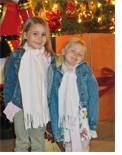 Well, everything is ready to share some richly welcomed days with our family. What I love most about this season is when all the preparations are finally done and time slows down so we can simply relax and enjoy each other. Grandchildren make that even more special. Also, Sara and I will be taking a break between Christmas and New Year’s to enjoy our family and be personally refreshed, so the office will be closed during that time. Orders won’t be filled again until January 4. I’m sorry for any inconvenience this will be to any of you and hope you’ll hold whatever business email you have until then. We truly need some time away from computers to let our souls refresh.
Well, everything is ready to share some richly welcomed days with our family. What I love most about this season is when all the preparations are finally done and time slows down so we can simply relax and enjoy each other. Grandchildren make that even more special. Also, Sara and I will be taking a break between Christmas and New Year’s to enjoy our family and be personally refreshed, so the office will be closed during that time. Orders won’t be filled again until January 4. I’m sorry for any inconvenience this will be to any of you and hope you’ll hold whatever business email you have until then. We truly need some time away from computers to let our souls refresh.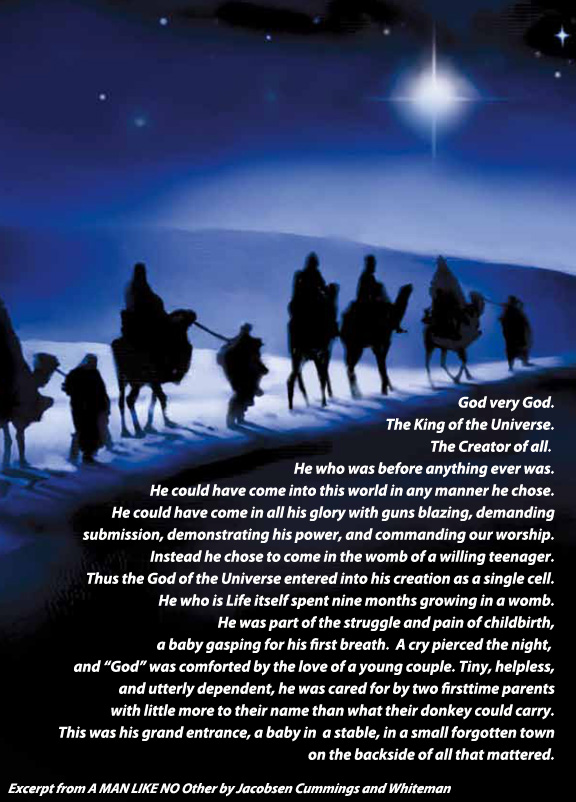

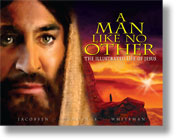 Responses to
Responses to 
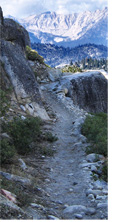 I love the stories I get to hear and be a part of as people grow in the Father’s love, even through the most unexpected changes. I met Daryl years ago when we were both vocational pastors in Visalia, CA. We’ve stayed in touch through the years and have even crossed paths at a number of different locations around the US. I have walked with him through his wife’s unfaithfulness and then divorce. Watched him start a new business venture and then his business partner betray him. I watched him pass over some pretty shaky theological ground, and yet Daryl kept coming back to an unrelenting desire to follow Jesus and to find his security in the Father’s love.
I love the stories I get to hear and be a part of as people grow in the Father’s love, even through the most unexpected changes. I met Daryl years ago when we were both vocational pastors in Visalia, CA. We’ve stayed in touch through the years and have even crossed paths at a number of different locations around the US. I have walked with him through his wife’s unfaithfulness and then divorce. Watched him start a new business venture and then his business partner betray him. I watched him pass over some pretty shaky theological ground, and yet Daryl kept coming back to an unrelenting desire to follow Jesus and to find his security in the Father’s love. I’m waiting at the Dallas airport for my flight home from three days in Louisiana and two in Jasper, TX. As wonderful as these last days were with two very different groups of people, it is always a joy to head toward home and those I love. So this is a day filled with fond good-byes and the rising anticipation of getting home to Sara, Lord willing, later tonight.
I’m waiting at the Dallas airport for my flight home from three days in Louisiana and two in Jasper, TX. As wonderful as these last days were with two very different groups of people, it is always a joy to head toward home and those I love. So this is a day filled with fond good-byes and the rising anticipation of getting home to Sara, Lord willing, later tonight.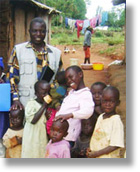 I hope you’re not getting tired of me writing about Kenya. It has been some time since I last brought them to your attention because I know how easy it is for any of us to be fatigued over an ongoing, persistent need. We hear about it every day in our own country with the economic downturn and I also know that many of you have others you’re in touch with in the world that need a helping hand.
I hope you’re not getting tired of me writing about Kenya. It has been some time since I last brought them to your attention because I know how easy it is for any of us to be fatigued over an ongoing, persistent need. We hear about it every day in our own country with the economic downturn and I also know that many of you have others you’re in touch with in the world that need a helping hand. I get as many questions about parenting outside the traditional congregation as I get on any other topic. It seems many believe there is a right way to raise our children and if we can learn all the principles involved we can guarantee that our kids will be good examples of what it means to follow Jesus by never making mistakes and always having a Godly attitude. At least we want to save them from the mistakes we made. And that’s a recipe for disaster and self-condemnation if I ever heard one.
I get as many questions about parenting outside the traditional congregation as I get on any other topic. It seems many believe there is a right way to raise our children and if we can learn all the principles involved we can guarantee that our kids will be good examples of what it means to follow Jesus by never making mistakes and always having a Godly attitude. At least we want to save them from the mistakes we made. And that’s a recipe for disaster and self-condemnation if I ever heard one.